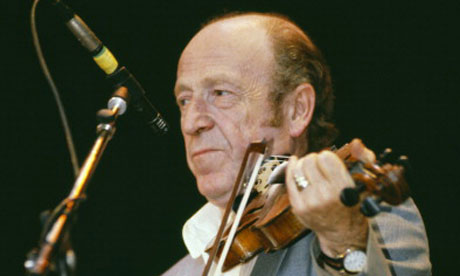Martin Fay obituary | The Guardian
Martin Fay, who has died aged 76, was the original fiddle player with the Chieftains, the band that has done more than any other to popularise Irish traditional music globally. Led by the charismatic piper Paddy Moloney, the Chieftains collaborated with musicians from a wide range of genres and cultures – from bluegrass to Chinese and Mexican music – and brought in guest performers such as Mick Jagger, Van Morrison and James Galway. Yet traditional tunes lay at the heart of the band, with Fay's fiddle a vital part of their distinctive sound.
Fay was born in Cabra, Dublin, where his mother taught him to play the piano. As a boy, he was captivated by the music (played by Yehudi Menuhin) in the film The Magic Bow (1946), about the life of Paganini, and he changed instrument. He progressed well in his classical violin lessons and at 15 was playing in a Butlins holiday camp orchestra. After leaving school at 18, Fay worked in an office by day and in the evenings played in the Abbey theatre orchestra, where he met the Abbey's musical director, Seán Ó Riada.
In the 1950s, traditional music was regarded as distinctly old-fashioned in Ireland, but Ó Riada's success with a film score, and a play at the Abbey, encouraged him to establish a folk orchestra which included Fay, Moloney and the tin-whistle player Seán Potts. Instead of all the musicians playing together in unison, as in the established ceilidh bands, Ó Riada wanted to create a chamber orchestra, playing arrangements of folk music. Fay's classical music background was essential for this approach. The resulting ensemble, Ceoltóirí Cualann, enjoyed radio success and, in 1961, played the soundtrack for a film of The Playboy of the Western World. Fay was soon earning more playing traditional music than in his day job.
Garech Browne, a member of the Guinness family and founder of the Claddagh record label, asked Moloney to record some traditional Irish music. Moloney brought in Fay, Potts and Michael Tubridy on flute, and used a similar approach to arranging the tunes. Their eponymous album, The Chieftains, was released in 1963, before they first performed in public. The success of this new approach to traditional Irish music led to radio and television work, and they attracted celebrity fans. Browne was a great thrower of parties, where the guests included Jagger, Princess Grace of Monaco, Peter O'Toole and Sean Connery, with the Chieftains invariably playing through the night.
By 1968, Moloney was working full time for Claddagh, and when he, Potts and Fay were offered a recording contract by a rival company, Gael Linn, Moloney refused to sign. Potts and Fay thought that their future lay with Gael Linn and they left the Chieftains, only to return a year later. In the meantime, Seán Keane had joined to play fiddle, but on Fay's return the pair worked well together.
The Chieftains' popularity was extending far beyond folk enthusiasts but they were still playing only in their spare time. That changed in 1975 when they provided music for the Oscar-winning score of Stanley Kubrick's film Barry Lyndon and the promoter Jo Lustig booked the group into the Royal Albert Hall in London on St Patrick's Day. The sell-out concert was a triumph, and Fay and his fellow Chieftains finally gave up their day jobs.
The relentless international touring took its toll on band members with young families, and Tubridy and Potts left, to be replaced by the flautist Matt Molloy. Fay was happy to continue. A reserved and modest man with a great sense of humour, he was unfazed by the pressures of extensive touring. He was the only Chieftain not to be racked by nerves when playing to well over a million people at Phoenix Park during Pope John Paul II's visit to Dublin in 1979.
Although he had a classical training, Fay had a natural understanding of traditional music. He was a master of changing the mood at Chieftains concerts from the lively onstage parties to a more tranquil atmosphere, through his emotional interpretations of the slow airs. In total, Fay recorded more than 30 albums with the group before he withdrew from touring in 2001 and retired altogether in 2002.
Fay is survived by his wife, Gráinne, and their children, Fergal and Dearbhla.
• Martin Fay, musician, born 19 September 1936; died 14 November 2012
Martin Fay obituary | Music | The Guardian







Comments